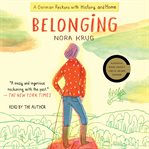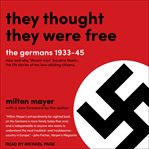Review by Booklist Review
Krug, born in Germany in the 1970s, relates her lifelong search to understand her homeland and family in the still-dark shadow of WWII. From her teen years on, she feels a gnawing guilt over her heritage and also that she lacks a true heimat, or place of deep familiarity. As an adult, she consults historical records and genealogists to piece together her family's past. Her personal and scholarly exercise becomes an often-uncomfortable test of her determination. Waiting to receive the U.S. military file on her grandfather, recorded in 1946 but just recently made available, she feels she's about to "find out if it's malignant or not." Photos, pressed flowers, personal letters, historical documents, and her own illustrations and comics make up Krug's mixed-media illustration style, with which she conveys significant emotion. Backgrounds and text are occasionally both so light or dark that her words are practically illegible text is often broken by illustrations in the center of the page, adding to the essentially fragmented nature of her search. A deep and affecting mix of text and illustration.--Annie Bostrom Copyright 2018 Booklist
From Booklist, Copyright (c) American Library Association. Used with permission.
Review by Publisher's Weekly Review
In this provocative search into her family history, Krug, a Gen X German and longtime U.S. resident, struggles to reconcile homesickness for a land of mystical forests and finely made products with the guilt she feels regarding her ancestor's possible Nazi involvement. She cites the German saying "order is half your life's battle" and takes a stereotypically German approach to a detailed process that might be called "restorative documentation" for justice. Krug delves deep into archives official and familial, from 1930s and '40s German phone books to the Google street view of a Jewish retiree's Florida residence. She hopes the latter can tell her whether her grandfather was a "true" Nazi or a sometimes-vocal critic who was strong-armed into joining the party to keep employed. The resulting scrapbook collage is as lush as it is meticulous, containing folk-art-style depictions of historical events, realistic illustrations, and photographs. Krug remarks on the taboo of talking about German gentile suffering as she relates the sad story of her uncle, killed at 18 in Italy, in whose shadow her father was born into grief. Like most obsessions, Krug's yields limited results; some facts remain unknowable and some deeds irredeemable. But this work of stunning craftsmanship stands as a testament to speaking out as a necessary first step to healing. Agent: Alex Jacobs, Cheney Agency (Oct.) © Copyright PWxyz, LLC. All rights reserved.
(c) Copyright PWxyz, LLC. All rights reserved
Review by Library Journal Review
Krug (Kamikaze) examines her past, present, and future as a German in this exquisitely illustrated and hand-lettered graphic novel. Being German has always connected Krug to the horrors of the Nazi reign of her home country, and throughout her childhood she wrestled with understanding her family's involvement in the war. Here she details conversations with her parents, long-lost and distant relatives, as well as her trip back to Germany, where she attempts to make sense of historical records, memories, and intense emotional responses as she learns the answers to questions she's been struggling with since coming to live in America 20 years ago. Photographs, letters, drawings, and thrift-store finds are included as touchstones for readers as they travel along with Krug on her journey. The entire story is tied in to the idea of heimat, the German word for the place that first forms us, and Krug's quest to determine what that means for herself and her family. VERDICT A touching story of questioning the unquestionable and finding yourself in the process. Recommended for teens and adults as well as those interested in a highly visual family examination across generations. [See Prepub Alert, 4/30/18.]-Traci Glass, -Multnomah Cty. Lib., Portland, OR © Copyright 2018. Library Journals LLC, a wholly owned subsidiary of Media Source, Inc. No redistribution permitted.
(c) Copyright Library Journals LLC, a wholly owned subsidiary of Media Source, Inc. No redistribution permitted.
Review by Kirkus Book Review
A graphic artist of German descent tries to come to terms with her family's history before she was born.Not only was Krug too young to have memories of the Nazi era, but her parents weren't born until 1946. Yet she feels drawn to what happened before, a legacy that amounts to a search for identity, a pilgrimage to the homeland that risks guilt and shame. Neither of her parents seems to know much about their familial Nazi ties or to be inquisitive about learning more. Her father's brother had died as a teenage Nazi soldier, and their sister and her father had since been estranged. Her maternal grandfather had also served with the Nazis, and the level of his support remained something of a mystery. Krug felt blood ties to her ancestors but had no idea how deeply (or not) they had been entangled. She also felt stigmatized by the common stereotype of her as a German and what this seemed to reflect about her emotions, personality, and overall identity. The narrative is a deeply personaland deeply movingdive into national legacy and family history, with more text than most graphic novels and a graphic presentation that mixes documentary photographs, illustrations, and memories that predate the author's birth. Her obsession takes her from her home in Brooklyn, where she lives with her Jewish husband, to the Germany where her parents were born and raised, in search of documents and testimony. As she gets closer to something that feels like truth, she writes, "I feel a sudden pain, shallow but sharp and all-consuming as a paper cut, because even inherited memory hurts." Krug's efforts reunite a family and return to her a lost legacy.As multilayered as memory, the book intertwines text, photo, graphic art, and thematic complexity into a revelation almost as powerful for readers as it must have been for the author. Copyright Kirkus Reviews, used with permission.
Copyright (c) Kirkus Reviews, used with permission.


